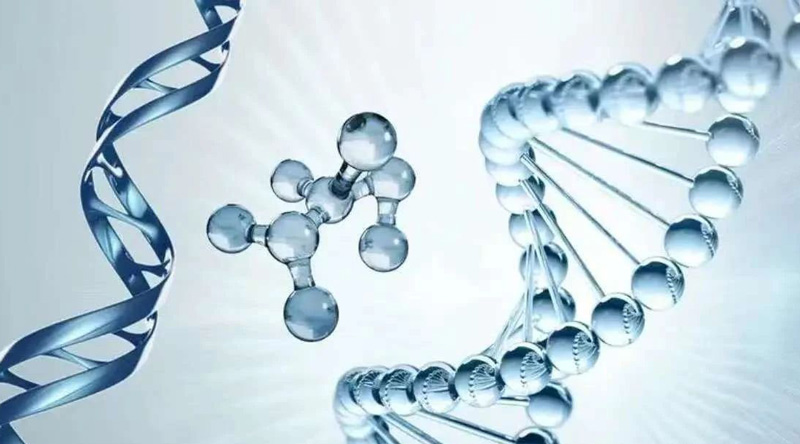
Dec 16, 2024 / Author: China Glutathione suppliers & NMN manufacturers
NMN (β-Nicotinamide Mononucleotide) has become a hot topic in recent years.
In the health field, NMN has been widely discussed due to its potential anti-aging effects.
Numerous studies have shown that NMN may help improve cellular energy metabolism and repair damaged DNA, thus delaying the process of aging.
This has led many people to place high hopes on it, hoping to maintain youthful vitality and improve physical function by supplementing NMN.

NMN is a precursor of NAD+ (nicotinamide purine dinucleotide).
NAD+ plays a crucial role in the cell, it is like the "energy currency" in the cell, involved in the last step of cellular respiration - oxidative phosphorylation process.
In a cell's mitochondria, electron transport creates a transmembrane proton gradient that drives ATP synthesis, and NAD+ is involved as an electron acceptor, providing the cell with sufficient energy.
As people age, the level of NAD+ in the body gradually declines.
It is as if the energy supply of a factory is diminishing, and the activities of cells are restricted.
The supplement of NMN can effectively increase the level of NAD+, so that the cell energy can be revitalized.
Sirtuins proteins are a class of NAD+ dependent deacetylases that play a key role in many physiological processes of cells, including gene expression regulation, cell cycle regulation, and DNA repair.
Sirt1 is one of the more well-studied members.
When NMN increases the level of NAD+, activated Sirt1 can deacetylate a variety of transcription factors.
For example, it can act on the p53 protein. Normally, the p53 protein plays an important role in maintaining genomic stability, but over-activation of p53 can lead to cellular senescence.
The deacetylation of p53 by Sirt1 can inhibit its senescence promoting function, thus delaying the process of cell senescence.
It can improve mitochondrial function.
Mitochondria is an energy factory in the cell, and its normal function is directly related to the energy supply and metabolic state of the cell.
The mitochondria of senescent cells often have dysfunction, which is manifested by decreased mitochondrial membrane potential, decreased ATP synthesis, and increased ROS production.
By increasing the level of NAD+ and activating mitochondria-related Sirtuins proteins such as Sirt3, NMN can regulate various metabolic enzymes in mitochondria, such as isocitrate dehydrogenase, so as to optimize the metabolic process of mitochondria, reduce the production of ROS, and improve the antioxidant capacity of cells.
In the process of cell life activities, DNA will be constantly damaged by various internal and external factors, such as ultraviolet radiation, chemical stimulation and reactive oxygen species (ROS) produced by cell metabolism.
DNA damage, if not repaired in time, can lead to genetic mutations and abnormal cell function.
NAD+ dependent PARP (polyADP-ribose polymerase) is one of the key enzymes in DNA damage repair.
When DNA damage occurs, PARP is activated, using NAD+ as a substrate to repair the damaged DNA.
After NMN improves the level of NAD+, it provides enough "raw materials" for PARP, enhances the DNA repair ability of cells, and enables cells to better cope with various damage factors and maintain the stability of the genome.

Autophagy is a self-cleaning mechanism in cells, which can remove damaged organelles, protein aggregates and other "garbage" in cells.
Proper autophagy is essential for maintaining a stable intracellular environment.
NMN may influence the activity of autophagy by regulating signaling pathways such as mTOR.
When NMN increases the level of NAD+, it can inhibit the mTOR signaling pathway, thus activating autophagy, helping cells remove harmful components, and maintaining the health of cells.
The completion of endothelial cell function is essential for maintaining normal blood circulation.
With the increase of age, vascular endothelial cells will appear dysfunction, such as decreased vasodilation function.
NMN can enhance the level of NAD+, activate Sirt1 and other proteins, regulate the activity of endothelial nitric oxide synthase (eNOS), and promote the production of nitric oxide (NO).
NO is an important vasodilator that dilates blood vessels and improves blood circulation, thereby reducing the risk of age-related diseases such as vascular disease.
Supplier Introduction: China glutathione supplier and NMN manufacturer GSHworld, the company mainly develops biotechnology and industrialization. As a global pioneer in enzymatic catalytic ATP regeneration technology, our company advocates green production and is committed to providing customers with better and more environmentally friendly products and services. Glutathione Manufacturer,NMN Factory,Citicoline Sodium supplier,China NMN manufacturers
PREVIOUS:NMN Scientific Guidelines for use
NEXT:Studies have found that NMN supplementation can improve the symptoms of dry mouth aging
+86-755-23577295
+86 18718790084
Room 832, Building 12, Shenzhen Bay Science and Technology Ecological Park, Yuehai Street, Nanshan District, Shenzhen China